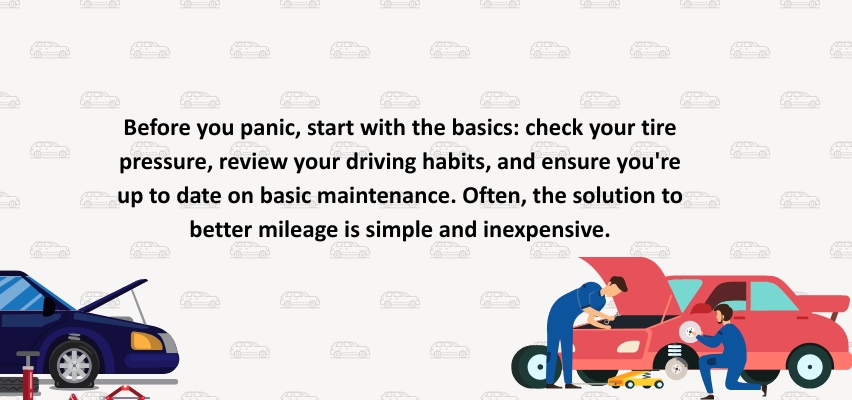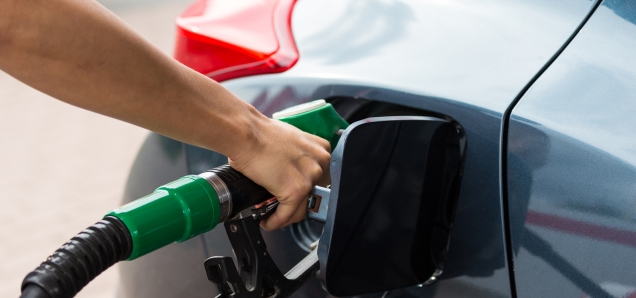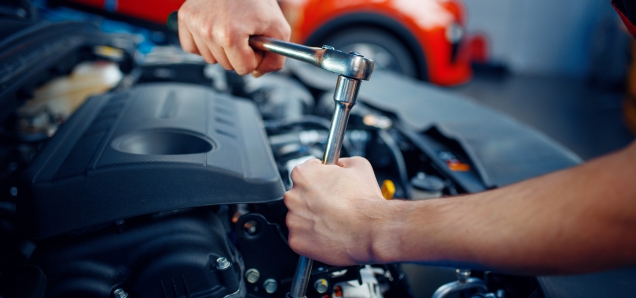Why Your Petrol Car's Mileage Is Dropping: Causes and Solutions
Are you visiting the gas station more often these days? That steady decline in your vehicle's fuel efficiency isn't just costing you money—it could be signaling underlying issues that need immediate attention. In today's world of fluctuating fuel prices, understanding what's behind your petrol car's dropping mileage is more important than ever. This comprehensive guide will explore the common culprits behind worsening fuel economy and provide practical solutions to help you restore your vehicle's efficiency and save money at the pump.
1. The Gradual Decline: Why Mileage Matters
-
Fuel efficiency, typically measured in miles per gallon (mpg) or kilometers per liter (km/L), represents how far your vehicle can travel on a unit of fuel. This crucial metric directly impacts your operating costs and environmental footprint. According to the Environmental Protection Agency, the average fuel economy for 2020 model vehicles was 25.4 miles per gallon, but many factors can cause your actual mileage to fall well below this benchmark.
-
While some mileage reduction occurs naturally as vehicles accumulate miles, a sudden or dramatic drop often indicates specific problems that need addressing. The good news? Most issues that contribute to poor fuel economy are identifiable and fixable with proper knowledge and maintenance.
2. Maintenance Issues That Kill Your Mileage
-
2.1 Faulty Oxygen Sensors:
Your vehicle's oxygen sensor plays a critical role in maintaining optimal fuel efficiency. This component measures whether the air-fuel mixture is too lean or rich and sends this data to your car's computer. A malfunctioning sensor can provide incorrect readings, causing the system to use more fuel than necessary. According to industry experts, a bad oxygen sensor can reduce fuel efficiency by up to 40%, making it one of the most significant contributors to poor mileage.
Most modern vehicles have multiple oxygen sensors that typically need inspection or replacement before reaching 100,000 miles. If your check engine light appears, it could be signaling oxygen sensor failure, among other issues. Thankfully, oxygen sensors are relatively affordable to replace, and addressing this problem can lead to substantial improvements in fuel economy.
-
2.2 Clogged Air Filters
Your engine requires a precise mixture of air and fuel for efficient combustion. A dirty or clogged air filter restricts airflow to the engine, disrupting this balance and forcing your vehicle to burn more fuel to maintain performance. This problem is particularly common in older vehicles with carburetors, but even modern engines suffer when air filters become clogged with debris 1.
Replacing your air filter at recommended intervals (typically every 15,000-30,000 miles, but check your owner's manual for specific guidance) is one of the simplest and most cost-effective ways to maintain fuel efficiency. During oil changes, ask your technician to inspect the air filter and replace it if necessary.
-
2.3 Worn Spark Plugs and Ignition Issues
The ignition system—including spark plugs, coils, and wires—is responsible for combusting the air-fuel mixture in your engine. When spark plugs wear out or become dirty, they can misfire, preventing complete combustion of fuel. This results in wasted gasoline and noticeably reduced power.
Regular tune-ups that include spark plug replacement according to your manufacturer's schedule can prevent this issue. One driver reported a dramatic restoration of fuel economy (from 16 kmpl to 22 kmpl) after simply replacing faulty spark plugs, highlighting how significant this maintenance item can be.
-
2.4 Old or Incorrect Engine Oil
Using the wrong viscosity of engine oil or extending oil change intervals beyond recommendations can negatively impact fuel efficiency. Thicker oils create more resistance between engine components, forcing the engine to work harder and burn more fuel. While high-mileage engine oils contain seal conditioners that benefit older engines, they may slightly reduce fuel economy due to their increased viscosity.
Always use the oil grade recommended in your owner's manual and adhere to the suggested change intervals. Synthetic oils typically offer better performance and can help reduce engine friction, potentially improving mileage.
3. Tire and Wheel Factors
-
3.1 Underinflated Tires
Many drivers overlook tire pressure as a factor in fuel economy, but it's one of the most common causes of worsening mileage. Underinflated tires increase rolling resistance, meaning your engine must work harder to maintain speed. Even running just 5 PSI below the recommended pressure can create enough drag to reduce fuel economy, often without triggering your tire pressure monitoring system (TPMS) warning.
Check your tire pressure at least once a month and before long trips, using the recommended pressure listed in your owner's manual or on the driver's side door jamb (not the maximum pressure on the tire sidewall). Properly inflated tires not only improve fuel economy but also wear more evenly and handle better.
-
3.2 Excessive Air Conditioner Use
While air conditioning provides comfort in hot weather, it places an additional load on your engine, forcing it to burn more fuel. At lower speeds, consider rolling down windows instead of using AC. However, at highway speeds, open windows can create aerodynamic drag that may outweigh the AC's energy consumption, so finding a balance is key.
-
3.3 Unnecessary Idling
Contrary to popular belief, modern vehicles don't require extended warm-up periods. Idling for more than 30 seconds wastes fuel while getting 0 mpg. The Department of Energy estimates that idling wastes six billion gallons of fuel annually nationwide.
Turn off your engine if you expect to be stationary for more than 30-60 seconds (except in traffic). In cold weather, limit warm-up time to 30 seconds before driving gently.
4.Fuel System Problems
-
4.1 Clogged Fuel Injectors
Fuel injectors are precision nozzles that spray fuel into your engine's cylinders in a specific pattern for optimal combustion. When they become dirty or clogged, they spray fuel inefficiently, similar to a poorly pressurized showerhead. This disruption to the air-fuel mixture leads to incomplete combustion and wasted fuel.
Using quality fuel and occasional fuel injector cleaner can help prevent buildup. If you notice stumbling acceleration or reduced power, have a professional clean or replace your fuel injectors.
-
4.2 Dirty Fuel Filters
Fuel filters protect your engine by trapping contaminants before they reach critical components. A clogged fuel filter restricts fuel flow, lowering pressure and causing your engine to run poorly. For older cars, especially, fuel filters should be changed approximately every two years or 30,000 miles.
If you experience performance issues alongside poor mileage, ask your mechanic to test fuel pressure and inspect the filter.
-
4.3 Fuel Quality Issues
Using low-quality petrol can introduce contaminants that clog your fuel system and reduce combustion efficiency. While premium fuel isn't necessary for all vehicles, consistently using reputable fuel from trusted stations helps maintain system cleanliness.
Occasionally, using a quality fuel additive can help clean injectors and restore performance. If you drive a high-performance vehicle, follow manufacturer recommendations regarding fuel octane ratings.
5. Environmental and Seasonal Factors
-
5.1 Cold Weather Effects
Fuel efficiency typically decreases in colder weather for several reasons: engines take longer to reach optimal operating temperature, winter fuel blends have slightly less energy, and idling time increases. Cold weather can reduce fuel economy by 10-20% depending on severity.
Combine short trips when possible to allow your engine to reach proper operating temperature. Consider using a block heater in extreme cold to reduce warm-up time.
-
5.2 Short Trip Driving
Frequent short trips prevent your engine from reaching its most efficient operating temperature, resulting in increased fuel consumption. The engine requires more fuel when cold to atomize and combust the air-fuel mixture properly.
Combine errands to minimize cold starts and allow your vehicle to warm up completely. If your daily commute involves very short trips, consider alternative transportation whenever possible.
6. Solutions and Preventive Measures
-
6.1 Comprehensive Maintenance Schedule
The single most effective approach to maintaining fuel efficiency is adhering to your manufacturer's recommended maintenance schedule. Regular oil changes, filter replacements, spark plug inspections, and system checks keep your vehicle running as designed 110.
Create a maintenance log to track service intervals for all critical systems. Proactive maintenance prevents small issues from becoming major problems that drastically impact fuel economy.
-
6.2 Driving Habit Adjustments:
Conscious driving dramatically improves fuel efficiency. Beyond avoiding aggression behind the wheel, consider these techniques:
Anticipate traffic flow: Look ahead to maintain momentum and avoid unnecessary braking/acceleration
Observe speed limits: Fuel economy typically decreases rapidly above 50 mph
Reduce cargo weight: Remove unnecessary items from your vehicle
Minimize aerodynamic drag: Remove roof racks when not in use
-
6.3 Diagnostic Checks:
When experiencing sudden mileage drops, seek professional diagnostics. Modern vehicles can generate error codes that pinpoint specific issues affecting fuel economy. Mechanics can perform:
Leak-off tests to check injector functionality
Compression tests to assess engine health
Emissions testing to identify combustion issues
Brake drag tests to check for resistance
-
6.4 Tire Maintenance Routine:
Implement a tire maintenance routine that includes:
Monthly pressure checks (when tires are cold)
Rotation every 5,000-8,000 miles
Annual alignment checks
Periodic balancing
Consider investing in low rolling resistance tires designed specifically to improve fuel economy
7.When to Seek Professional Help:
-
While some mileage issues can be addressed with basic maintenance and habit changes, persistent problems may require professional intervention. If you've addressed the common issues without improvement, consult a qualified mechanic for:
-
Check engine light diagnosis: Code reading can identify sensor and system failures
-
Exhaust system inspection: Catalytic converter issues can impact efficiency
-
Advanced fuel system diagnostics: Injector balance and pressure testing
-
Engine mechanical assessment: Compression tests can reveal internal wear
Why It Matters:
Your petrol car’s mileage can drop for many reasons, from maintenance issues to driving style.
Faulty oxygen sensors, clogged air filters, worn spark plugs, or using the wrong engine oil can
all force the engine to burn more fuel than necessary. Tire problems such as underinflated tires
or poor wheel alignment further increase resistance and reduce efficiency. Finally, aggressive
driving habits like rapid acceleration, harsh braking, and high speeds can lower gas mileage by
up to 30% on highways and 40% in city traffic. Regular maintenance and smoother driving are the
simplest ways to restore fuel economy and save money at the pump.


